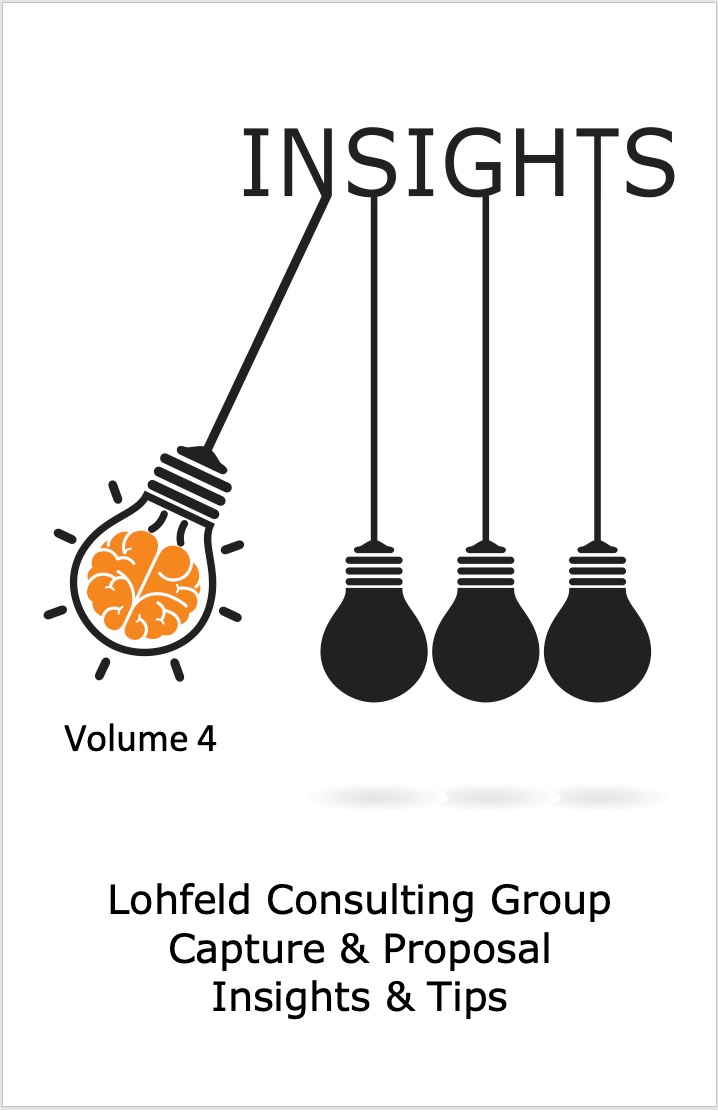Audio Tip: Three Keys to Creating Winning Proposals
Alternative content
This month, capture and proposal development expert and columnist for Washington Technology magazine, Bob Lohfeld, offers three keys for creating winning proposals.
Creating winning proposals is not the same as writing a proposal. Anyone can write a proposal for government work, given enough time and resources. However, only one bidder writes the winning proposal. The best proposals have three things in common:
- They are directed and written by talented people experienced at writing proposals.
- They follow a similar, defined process.
- They are designed in an environment that creates proposals efficiently.
Your capture and proposal managers bring necessary skills to plan, staff, lead, and control your capture campaign and develop your competitive proposal. The capture manager leads the campaign, and the proposal manager comes in before RFP release to focus on developing the proposal.
This team knows that the first step to a winning proposal is developing a winning solution. During the capture and pre-proposal phases, they work together to:
- Create a clear win strategy derived from a competitive assessment focusing on your competitors’ strengths and weaknesses.
- Develop and document the solution. This includes completing design trade-offs, conducting reviews, and approving the solution before writing the technical and management response.
- Build in significant strengths. They engineer features, benefits, and discriminators into your proposed solution to show that your approach increases your likelihood of successful performance or that your solution exceeds a requirement in a way that benefits the client.
Although each proposal is different, the process used to create winning proposals generally has these characteristics:
- Early proposal planning and development;
- A compliant, easy-to-evaluate proposal structure;
- Proposal sections designed before writing; and
- Responsive and compelling proposal text.
Bonus Tip: Winning proposals are developed in an environment with a well-established proposal development process, using appropriate tools to facilitate the process, including a collaborative workspace, virtual meeting tools, and up-to-date company information and proposal artifact databases.
How do your proposals stack up against these characteristics?
Paperback or Kindle
10 steps to creating high-scoring proposals
by Bob Lohfeld
contributors Edited by Beth Wingate
Subscribe to our free ebrief
Teaming friends, frenemies, and enemies—12 tips to mitigate harmful effects
Did you know that contracting officers spend up to 20% of their time mitigating disputes between teaming partners? In an informal poll we conducted on LinkedIn last month, 40% of respondents classified their teaming partners as “frenemies” on their last bid.
Explore Further
- Advice (446)
- AI (5)
- APMP (17)
- Business Development (198)
- Capture Management (197)
- Favorite Books (5)
- Go-to-Market (27)
- Graphics (6)
- Lohfeld Books (3)
- Past Performance (58)
- Post-submission Phase (15)
- Pre-RFP Preparation (211)
- Proposal Management (270)
- Proposal Production (60)
- Proposal Reviews (27)
- Proposal Writing (77)
- Pursuit Phase (89)
- Research Report (2)
- Resources (60)
- Tools & Tips (259)
- Training (10)
- Uncategorized (220)

Sign Up for INSIGHTS and Download your FREE book
We'd love to help you with your proposals. Enjoy our complimentary Lohfeld Consulting Group Capture & Proposal Insights & Tips book with your FREE subscription to our Insights Newsletter.
GET YOUR FREE BOOK




